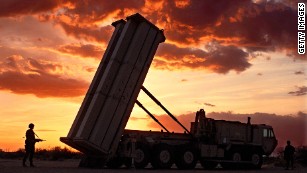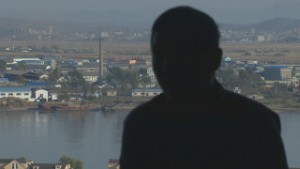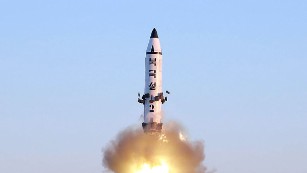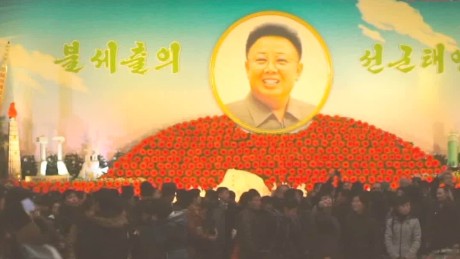Why China's coal ban isn't likely to stop North Korea's weapons
China's announcement that it will suspend the import of North Korea coal until the end of 2017 appears to be a significant expression of Beijing's continued frustration with the Pyongyang regime.
On the one hand, the decision can be viewed as a delayed commitment to enforce existing UN sanctions against North Korea, to which China, as permanent member of the Security Council, played a key role in passing.
Following years of vaguely worded resolutions that allowed for flexible interpretation by China, UN Security Council Resolution 2321 passed last November, which included an explicit target of reducing coal imports by 62%.
Several more immediate factors may, however, explain the timing of China's announcement.
These include the suspected North Korean involvement in the alleged assassination of leader Kim Jong Un's half-brother Kim Jong Nam, who had reportedly been living under Chinese protection in Macau and was an advocate of Chinese-style reforms in North Korea.

What is THAAD?
Perhaps more significantly, however, North Korea's oft-cited role as strategic buffer state vis-à-vis US-aligned South Korea has been increasingly undermined with the decision to deploy the Terminal High Altitude Area Defence (THAAD) missile defense system in the South.
Despite South Korean and US emphasis on the defensive nature of THAAD, Beijing is suspicious of the capacity that the system's radars have to monitor China's own missiles.
More broadly, the Trump administration's more hawkish approach to China may have led Beijing to reassess the strategic value of its relationship with North Korea. By extension, the suspension of coal imports might thus be a form of "pay off" for Trump's more recent apparent acceptance of the "One China" policy.
Will China's coal ban hurt North Korea?
Whatever the precise reasons for China's announcement, a more important question in gauging the likely impact of the measures, is to what extent the China's new restrictions on coal imports from North Korea will be implemented on the ground.
Customs agencies on the Sino-North Korean border are known for being relatively lax and understaffed, and widespread smuggling takes place in the region. Stringent sanctions on the coal trade may simply drive more it underground.

The North Korea you aren't meant to see
Though coal exports remain North Korea's single largest exported item, the slowdown in the Chinese economy since 2014 has already led to decreased demand for the mineral. Instead, economic exchange between the two countries has been increasing in other areas.
For example, Chinese clothing companies have increasingly outsourced production to North Korean trading companies as a result of rising wages in China and low-cost labor in North Korea. In recent years, there has also been the increasing dispatch of North Korean workers to Chinese border cities such as Dandong, Hunchun and Yanji.
As such, limitations on coal exports will no doubt have some impact on North Korea's earning of foreign exchange, but will be partly offset by growth in other sectors.
Will the ban curb Pyongyang's nuclear program?
The scope for China's restrictions on coal imports to impact upon North Korea's foreign exchange earnings certainly exists, and for sanctions advocates, this may offer a ray of hope that the sanctions regime may yet work. This is likely to be wishful thinking, however.

Why North Korea's new missile matters
For a country that regards its external environment as irredeemably hostile and places the survival of the regime above all other goals, it is hard to see that the deprivation of foreign exchange will be significant enough to have any direct impact on Pyongyang's willingness to finance its nuclear and missile programs.
Livelihood exemptions within the international sanctions regime notwithstanding, an arguably more realistic scenario is that China's enforcement of sanctions may produce widespread hardship that results in social unrest and potential regime change from within.
Contrary to oft-made predictions concerning the country's impending collapse, however, it seems that the paradox of the North Korean regime is not its instability but its resilience.
Even during the time of the famine of the 1990s, long before North Korea's mineral export boom, there was a distinct lack of any overt actions of resistance amongst the North Korean populace. In addition, sanctions are widely regarded as ineffectual if there are no existing splits amongst elites or opposition movements within the country. North Korea is notably lacking in either.

North Korea celebrates late leader's birthday
China finds itself in a dilemma, however. Beijing has repeatedly expressed skepticism that North Korea can be persuaded to abandon its nuclear program through force, yet it is under intense pressure to enforce existing international sanctions against the country.
Stay up to date on the latest opinion, analysis and conversations through social media. Join us at Facebook/CNNOpinion and follow us @CNNOpinion on Twitter. We welcome your ideas and comments.
Whether or not China is correct on this point, it is nonetheless unrealistic to expect that Beijing is either willing or able to exert enough pressure on Pyongyang to induce it to change course.
Given this reality, there seems to be little evidence that Beijing has ceased in its calls for the resolution of the North Korean issue through negotiations.
Given the poor prospect of sanctions achieving their stated goals, perhaps it is time the world should listen.
News Courtesy: www.cnn.com











